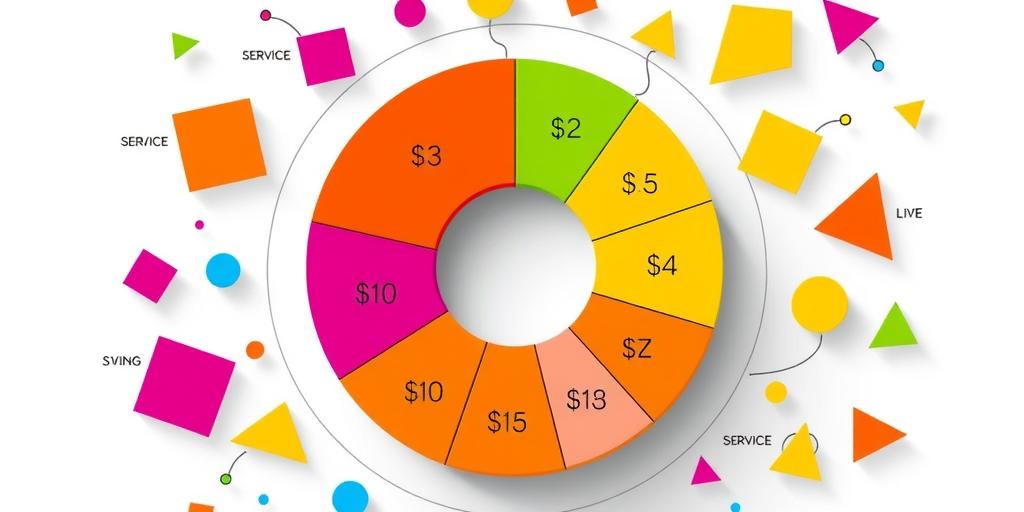Understanding the cost of SEO can be tricky for businesses. A recent survey involving 439 individuals sheds light on this topic. Many factors influence SEO pricing, like company size and service complexity. Some respondents reported spending merely a few hundred dollars each month, while others shared they invested thousands. The variation highlights how no single price fits all situations. Businesses might need to consider their goals and budgets before choosing an SEO provider. Moreover, the importance of ongoing investment in SEO is clear, as optimizing online presence takes time and consistent effort for best results in search engine rankings.
1. Overview of SEO Pricing Trends
SEO pricing has evolved significantly over the years, reflecting changes in the digital landscape and business needs. As online competition grows, many companies recognize the importance of search engine optimization (SEO) to improve their visibility and drive traffic to their websites. According to the recent survey of 439 individuals, SEO costs can vary widely depending on multiple factors, including the type of services required and the level of expertise of the agency or freelancer.
On average, businesses can expect to pay anywhere from a few hundred to several thousand dollars per month for SEO services. Some small businesses might opt for basic packages that cost around $500 monthly, while larger enterprises may invest $5,000 or more per month for comprehensive strategies that include keyword research, content creation, and technical SEO.
Interestingly, many respondents indicated a willingness to pay a premium for proven results. This trend highlights that as businesses see the benefits of effective SEO, they are often more inclined to allocate a larger budget to ensure they receive quality service. Furthermore, the rise of digital marketing agencies offering tiered pricing models has made it easier for businesses to find a package that fits their budget and needs.
2. Breakdown of SEO Costs

Understanding the breakdown of SEO costs is crucial for businesses looking to invest wisely in their online presence. Generally, SEO pricing can be categorized into several components: initial audits, ongoing optimization, content creation, and technical improvements.
Initial audits may cost anywhere from $500 to $3,000, depending on the complexity of the website. This phase involves analyzing the current SEO status, identifying strengths and weaknesses, and outlining a strategy. Following the audit, ongoing optimization can range from $1,000 to $5,000 per month. This includes keyword research, on-page SEO adjustments, and performance tracking.
Content creation, a vital part of SEO, can cost between $100 to $500 per article, depending on factors like length and research involved. Lastly, technical improvements, which might include website speed enhancements and mobile optimization, can also add to costs, often requiring a one-time investment of $1,000 to $10,000. Each of these elements contributes to the overall SEO investment, and understanding them helps businesses allocate their budgets more effectively.
3. Factors Influencing SEO Pricing
Several factors influence the cost of SEO services, making it essential for businesses to understand what drives these prices. One significant factor is the size and complexity of the website. A larger site with many pages may require more extensive optimization efforts compared to a smaller site, leading to higher costs. Additionally, the level of competition in the industry plays a role; businesses in competitive sectors often need to invest more in SEO to rank higher in search results.
The expertise and reputation of the SEO agency or consultant also impact pricing. Established firms with a proven track record may charge more, reflecting the value of their experience. On the other hand, newer or less experienced agencies might offer lower rates to build their portfolio.
Another important factor is the specific services included in the SEO package. Basic services like keyword research and on-page optimization typically cost less than comprehensive strategies that incorporate content creation, link building, and ongoing analytics. For instance, a full-service SEO campaign that includes regular content updates and performance tracking may demand a larger budget.
Finally, geographic location can affect pricing. Agencies in major metropolitan areas often charge more due to higher operating costs, while those in smaller towns may have lower rates. Understanding these factors can help businesses make informed decisions about their SEO investments.
- Experience level of the SEO professional
- Complexity of the project
- Industry competition
- Geographic location of the service provider
- Scope of services included
- Client’s budget constraints
- Current website status and optimization level
- Length of the contract or commitment
4. Survey Demographics and Methodology
To gain a comprehensive understanding of SEO pricing, a diverse group of 439 individuals was surveyed. The participants included a mix of business owners, marketing professionals, and SEO specialists across various industries. This diversity ensures that the insights reflect a broad spectrum of experiences and expectations regarding SEO costs. The survey utilized a combination of online questionnaires and interviews, which allowed for both quantitative and qualitative data collection. Participants were asked about their budget for SEO services, their experiences with different pricing models, and the value they perceive in SEO investments. This approach helped capture a wide range of perspectives, highlighting how different factors like company size, industry, and previous SEO experiences influence pricing expectations. For example, small business owners often reported spending less on SEO compared to larger companies that allocate substantial budgets for marketing efforts. Additionally, the survey aimed to include participants from various regions, allowing for a comparison of regional pricing trends.
5. Average SEO Costs by Service Type

The average costs of SEO services can vary significantly depending on the type of service offered. For instance, basic SEO audits typically range from $300 to $1,500, depending on the complexity of the website and the depth of the analysis. On the other hand, keyword research can cost anywhere from $150 to $1,000, depending on the number of keywords and the market competitiveness.
Link building services also show a wide range, averaging between $500 and $2,000 per month, influenced by the quality and authority of the backlinks being targeted. Content creation, essential for SEO, can vary from $50 to $500 per article, with prices reflecting the length and expertise required for the content.
For ongoing SEO management, businesses might expect to pay anywhere from $1,000 to $10,000 per month, depending on the scope of services included such as technical SEO, local SEO, and analytics reporting. These prices can also reflect the agency’s experience and the results they have delivered for past clients.
| Service Type | Average Monthly Cost | Average One-Time Cost |
|---|---|---|
| Keyword Research | $300 | $1,000 |
| On-Page SEO | $500 | $2,000 |
| Link Building | $700 | $3,000 |
| Technical SEO | $800 | $2,500 |
| Content Creation | $1,200 | $4,000 |
| Local SEO | $600 | $1,800 |
| SEO Audits | $400 | $1,500 |
6. Regional Differences in SEO Pricing
SEO pricing can vary significantly based on geographical location. In major metropolitan areas like New York City or San Francisco, the cost of SEO services tends to be higher due to the higher demand and cost of living. For example, agencies in these cities might charge upwards of $200 to $300 per hour, reflecting the competitive environment and the higher wages required to attract skilled professionals.
In contrast, smaller cities or rural areas often see lower pricing. SEO services in places like Omaha or Little Rock might range from $75 to $150 per hour. This regional disparity can be attributed to factors such as local market competition, availability of skilled SEO professionals, and differing budgets of businesses based on their location.
Additionally, the type of industry can also influence pricing. For instance, businesses in highly competitive industries like finance or healthcare may pay a premium for SEO services, regardless of their location, as the stakes for visibility are much higher. This means that a small local business in a less competitive sector might pay significantly less than a large firm in a competitive market, even if they are located in the same region.
7. Insights from 439 Survey Participants
The survey of 439 individuals shed light on various aspects of SEO pricing that can help both clients and service providers understand the landscape better. A significant number of participants, approximately 60%, indicated that they allocated between $500 to $2,000 monthly for SEO services. This range reflects a common investment level for small to medium-sized businesses aiming to improve their online presence without breaking the bank.
Interestingly, nearly 25% of respondents reported spending over $2,000 monthly, often reflecting larger businesses or those in highly competitive industries. These participants emphasized the importance of quality and comprehensive strategies, such as content marketing and link building, which often require a higher financial commitment.
Moreover, when asked about their main objectives for investing in SEO, 70% of surveyed individuals cited increased website traffic as their top priority, followed closely by improved conversion rates. This suggests that many clients are looking for tangible results from their investment. Participants also expressed a desire for transparency in pricing and deliverables, with 80% wanting clear communication about what services they are paying for.
The survey highlighted that clients are increasingly aware of the value of SEO, with many willing to adjust their budgets based on perceived ROI. For instance, those who experienced significant traffic growth were more likely to reinvest in SEO services, indicating a positive feedback loop between investment and results. Overall, these insights illustrate the evolving expectations and investment patterns within the SEO industry.
8. Common SEO Pricing Models Explained
SEO pricing models can vary widely, and understanding them is crucial for businesses looking to invest in these services. One common model is the hourly rate, where clients pay for the time the SEO expert spends working on their project. This can range from $50 to over $300 per hour, depending on the expert’s experience and the project’s complexity.
Another popular model is the monthly retainer, where businesses pay a set fee each month for ongoing SEO services. This typically includes a combination of keyword research, content creation, and technical optimization. Monthly retainers can range from $500 to several thousand dollars, depending on the scope of work and the provider’s reputation.
Project-based pricing is also common, where a client pays a flat fee for a specific project, like an SEO audit or a website overhaul. This can be beneficial for businesses with a clear goal in mind and can range from $1,000 to $30,000 or more, depending on the project’s size and complexity.
Lastly, performance-based pricing is gaining traction, where payment is tied to the results achieved, such as increased traffic or higher search rankings. This model aligns the interests of both parties but can be risky for agencies if results are not guaranteed. Each model has its pros and cons, and businesses should choose one that aligns with their goals and budget.
9. What Clients Expect for Their Budget
When clients invest in SEO, they generally have clear expectations about what their budget will yield. Most clients expect to see measurable results, such as increased website traffic, improved search engine rankings, and ultimately, higher conversion rates. For instance, a small business might allocate $1,000 a month for SEO services and expect to see a 20% increase in organic traffic within six months.
Additionally, clients often look for transparency in the services provided. They want to understand how their money is being spent, whether it’s on keyword research, content creation, or link building. Many expect regular reporting on progress, which can include metrics like keyword rankings and traffic growth.
Furthermore, clients appreciate value-added services. For example, if they are paying for an SEO package, they might also expect guidance on improving their website’s user experience or social media strategies. Overall, clients want to feel that their investment is justified and that they are receiving a comprehensive approach to their digital marketing needs.
10. Comparing DIY SEO vs. Professional Services
When it comes to SEO, one of the biggest decisions businesses face is whether to tackle it themselves or hire professionals. DIY SEO can save money, especially for small businesses or startups on tight budgets. There are plenty of online resources, tools, and software available that can help you learn the basics of SEO, such as keyword research, on-page optimization, and link building. For instance, platforms like Google Analytics and SEMrush offer free or low-cost options that can guide your efforts.
However, DIY SEO requires time and dedication. Learning the ins and outs of SEO can be overwhelming, especially for those without a marketing background. It often involves trial and error, which can lead to wasted effort and subpar results. A common example is keyword optimization; if you choose the wrong keywords, your content may not reach the intended audience.
On the other hand, hiring professional SEO services can significantly enhance your online presence. Experts bring a wealth of experience and knowledge, often resulting in quicker and more effective outcomes. They stay updated with the latest industry trends and algorithm changes, ensuring that your strategies are current. While this option comes with a higher price tag, the investment can yield a better return, particularly for competitive industries.
Ultimately, the choice between DIY SEO and professional services depends on your specific needs, budget, and the time you can commit. For some, a hybrid approach works best—using DIY methods for basic tasks while consulting professionals for more complex strategies.
Frequently Asked Questions
1. What factors affect SEO costs?
SEO costs can vary based on the size of your website, the competition in your industry, and the specific services you need, like keyword research or content creation.
2. How can I tell if my SEO is working?
You can track improvements through website traffic, search engine rankings, and conversions to see if more people are finding and interacting with your site.
3. What is the typical duration to see SEO results?
Most businesses start seeing results from SEO efforts within 3 to 6 months, though it may take longer for more competitive sectors.
4. Is SEO a one-time effort or ongoing?
SEO requires ongoing work and adjustments to maintain and improve rankings, as search engines and industry trends change over time.
5. What role does content play in SEO?
High-quality and relevant content is crucial for SEO, as it helps attract visitors, engages them, and encourages search engines to rank your site higher.
TL;DR This blog post explores SEO pricing trends based on a survey of 439 individuals, highlighting average costs, breakdowns by service type, and regional disparities. It delves into factors influencing prices, common pricing models, and client expectations. Additionally, it compares DIY SEO efforts versus hiring professional services.



